|
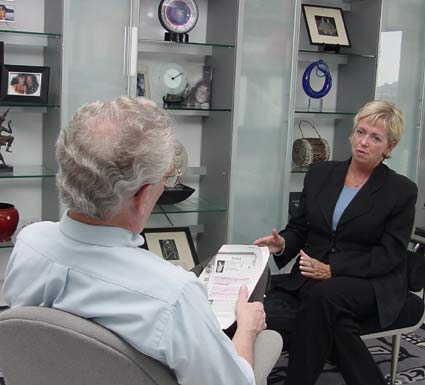 Al: Jeannette, I would like to get a little history
about you. Are you from Chicago?
Al: Jeannette, I would like to get a little history
about you. Are you from Chicago?
Jeannette: No, I actually grew up in Cincinnati,
Ohio. My mother was Portuguese, and my father met her on an island in the
Azores during WWII. He started there and was a radio disc jockey. My
grandfather owned a bunch of little stores like 7-11 on the island. They were
more like little huts around the island, and he had one that was right outside
the barracks. My mother would work there after school. She was a young
Portuguese girl, and she used to see all those great looking GI's. My mom and
dad met and fell in love. He would serenade her on the radio at night. It was
very romantic.
Al: What was your family name?
Jeannette: Lema. My older sister was born there, and
then they moved back to Tennessee where my dad was from originally. I was born
in Cincinnati. My dad went there because that's where the jobs were. He worked
for General Motors and was there for thirty years. I have lost both my parents
over the last few years, almost back to back. I am certain that those types of
things happening in one's life can also contribute to ones path or journey. You
know, when deaths occur you look at mortality, but even more so, you start to
look at why you are the person that you are. When I look in the mirror, I see
so much of my parents and everything that they brought into my life coming
through to me now. I remember when I was a kid, my dad wouldn't be there at
Thanksgiving dinner on time. He was out giving baskets of food to the St.
Vincent DePaul Society.
My mother was the only Portuguese in that small
town-probably within the state. She
had to deal with a lot of prejudices in her
lifetime. Just having a Portuguese accent resulted in my getting into fights at
school over my mom. I tried to protect her; they would call her names. The
town was very redneck.
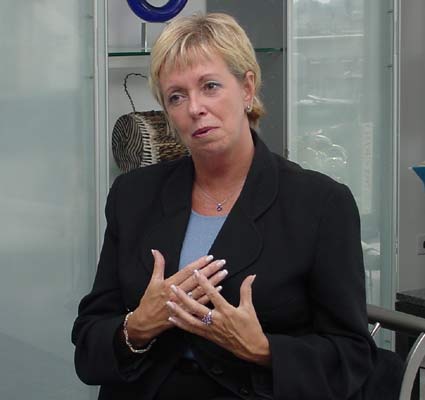 Al: What was the name of the town?
Al: What was the name of the town?
Jeannette: Bethel. It was a farming area, a dry
town. I think that people there just didn't have much exposure to the world.
Their only interests were in raising their families, keeping the community
going, and reading an occasional paper. My mom was called a "gook." I mean, it
just hurt her feelings terribly. As a young girl, I can remember being twelve,
and very feisty, and not about to accept that. Why did they want to hurt her?
I didn't understand it.
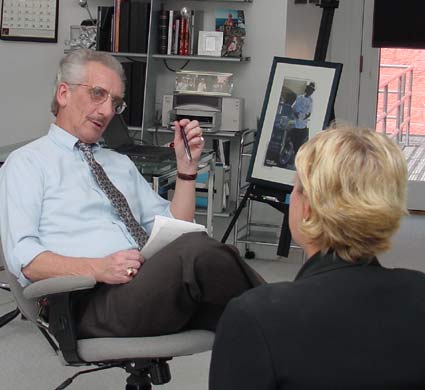 Al: But you see, those types of negative experiences
can make you who you are. You are more tolerant than many because of those
experiences in Bethel. You can empathize with hurt because you know what it
feels like.
Al: But you see, those types of negative experiences
can make you who you are. You are more tolerant than many because of those
experiences in Bethel. You can empathize with hurt because you know what it
feels like.
Jeannette: I totally agree. I believe that those
negative events are absolutely necessary in our lives to teach us about
ourselves and how to handle situations. Everything that happens in life happens
for a reason. If we truly believe that, then we can't just believe that all the
"good" things happen for a reason-all the "bad" things.
Al: I tell my college classes about the movie, The
Great Imposter, with Tony Curtis. He is leaving a monastery after being
kicked out by the abbot. The kindly cleric says to Curtis that it is from the
bad things that we learn the most-not from our successes.
I would like to revisit the racism issue if I might..
I thought when you told me about your mother being Portuguese in Tennessee, that
she would have had cultural shock-not been the subject of racism.
Jeannette: During the later years, yes, she felt a
little isolated culturally. However, like many people during that time that we
came to the States right after the war, she tries to be American. She just
wanted to learn English and how to be an American. Because of this, she tended
to forget her culture.
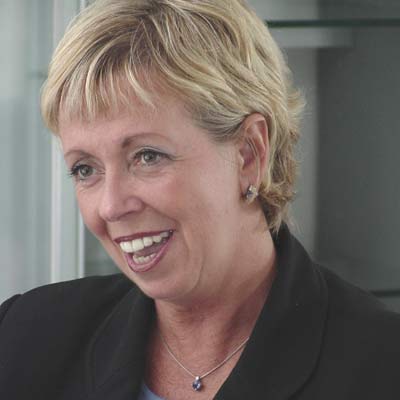 Al: Do you know any Portuguese?
Al: Do you know any Portuguese?
Jeannette: I have a lot of family, and I go back
every year. I met my godmother and my godfather, but I also have nieces,
nephews, and their little kids. I wanted to get to know them, so I started
studying the language a little bit. It's hard to keep up with it when you
aren't there, but I take my little book and seem to do ok. I spend time with my
godmother and my godfather and go to their house. It's beautiful, and I sit by the
ocean and think. I wondered what would have happened if my mother and father
had moved there instead of the states. How different my life would be. It's a
wonderful beautiful country, and I am totally enthralled by it and totally in
love with it.
Al: Did you see other forms of racism while living in
Bethel?
Jeannette: There was only one black family in the
town. I went to high school with the only black kid in the school. We called
him "Frenchie." He was a light-skinned, and he was also a drum major in the
band. Bethel was an incredible redneck town. They burned a cross in his front
yard, and within a month, he was gone.
All of the girls thought he was great. He knew how
to twirl a baton better than anybody that we knew, so he got a lot of
attention. Ohio is considered a Midwestern state, but if you live in a place
like Bethel that was right across the river from Kentucky, it was really a
prejudiced place.
My father worked at General Motors, and all the
guys he worked with on the line were African Americans. They would come over to
our house, or we would go to see them in the city. I never understood the
differences between blacks and whites. It infuriated me to see people treated
less than they deserved because of the color of their skin.
It's amazing really, how different regions can be.
I came to Chicago the first time in 1980. When I got here, I had this feeling
that this is where I was expected to live. There is a spirit in this Midwestern
city that is like none other that I have ever experienced. People seem really
to want to get along, and they really try to work together. They don't have
quite the attitudes that you find many times in New York. There's just a
wonderful sense of "let's get it done" here, and I felt that immediately.
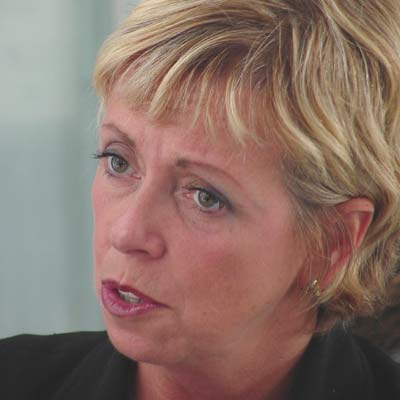 Al: Where did you get your education?
Al: Where did you get your education?
Jeannette: I attended the University of Cincinnati
and majored in business marketing.
Al: After you got your degree, what did you do next?
Jeannette: I got married, and then I got divorced-but
not before I had two great kids. Because of the divorce, I became a single mom,
and started working for a photography company out of Charlotte, NC. I began in
management and then continued to work my way up to operations. Before I knew
it, I became an international operations manager and opened studios for them
worldwide. I found myself in places like Paris, and I would always want to go
see how the "real" people lived. I would rent a car and go to the poor parts of
town. I needed to know what was really going on. It was wonderful. At one
point, I was overseeing about 300-studios worldwide and began really to learn
about sales. I found out how much I loved working with the creative side and
sales side. That's very unusual because generally speaking, I think most
creative people really don't want to have to go sell.
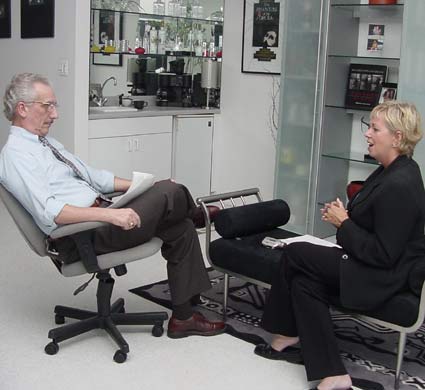 I won a sales trip at one point and went to
Caracas, Venezuela. My friend and I decided that we wanted to rent a car and
just go driving. We rented a little Volkswagen and went up into the mountains,
ate fresh fish, and got to meet people. When we started to return, we missed
the exit to go back to the hotel. Well, you know here in Chicago if you miss
the exit, you just keep going, take the exit, and come back. We drove a long
time and finally saw a place where we could pull off. I hoped that we could
just turn around. When we pulled off, here was a truck with a camouflaged
canopy. Gorillas came out, stuck long rifles in the car and demanded that we
give them our money and credit cards.
I won a sales trip at one point and went to
Caracas, Venezuela. My friend and I decided that we wanted to rent a car and
just go driving. We rented a little Volkswagen and went up into the mountains,
ate fresh fish, and got to meet people. When we started to return, we missed
the exit to go back to the hotel. Well, you know here in Chicago if you miss
the exit, you just keep going, take the exit, and come back. We drove a long
time and finally saw a place where we could pull off. I hoped that we could
just turn around. When we pulled off, here was a truck with a camouflaged
canopy. Gorillas came out, stuck long rifles in the car and demanded that we
give them our money and credit cards.
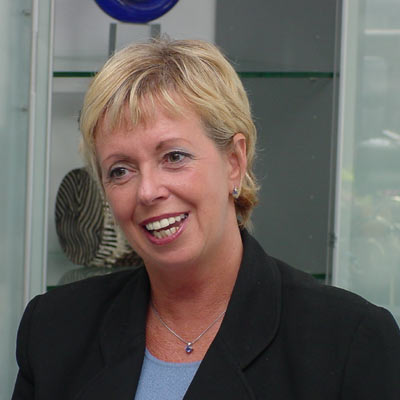 I remember seeing my kids' lives flash in front of
me. I knew I wasn't going to die. I just knew that I was lucky. That
experience taught me something very valuable about freedom. This would have
been about 1982, and I was still responsible for my kids and couldn't really
stop what I was doing in my life to analyze how I may be able to use what I was
learning for what I am doing now. I had to put food on the table, make sure the
kids were in soccer and doing all the things they needed to do while I was
supporting them. I was their sole support, until they were out of the house,
into college and getting one with their lives.
I remember seeing my kids' lives flash in front of
me. I knew I wasn't going to die. I just knew that I was lucky. That
experience taught me something very valuable about freedom. This would have
been about 1982, and I was still responsible for my kids and couldn't really
stop what I was doing in my life to analyze how I may be able to use what I was
learning for what I am doing now. I had to put food on the table, make sure the
kids were in soccer and doing all the things they needed to do while I was
supporting them. I was their sole support, until they were out of the house,
into college and getting one with their lives.
I am now married to my husband, Randy, who is the
President of the Azerty, a division of
United Stationery. He commutes back and forth from here to Canada. He would
say to me; "This is your time. Go and do the things you have wanted to do". I
still think my purpose in life is to try and make this world a better place.
I was offered a job about four years ago with a
major advertisement agency to head up their sponsorship area. I had to make a
decision whether I was going to take that job or start something on my own. I
was really stressing about it. Randy and I wound up going to Phoenix, Arizona
to interview some people at the Thunderbird School. At the time, he was
handling all Asian operations. We went to Sedona, which is not only beautiful,
but there is a wonderful current that runs through that whole area. It is very
spiritual; I immediately felt at home.
However, I was still stressing out about whether I
should take the job. Therefore, Randy said, "Let's go look at some art; you
always feel better when you do that." So, we did just that, but I just didn't
have any energy. I told Randy that needed a jolt of caffeine. There was a
coffee shop right next door, but there was also one through a rose garden. I
had been working to try to train myself to listen to my intuition for the last
four or five years. I thought that I would go with my intuition and go to the
one through the garden. When Randy walked up to the counter to get some coffee
for me, and I looked over and there was one book that was for sale in this tiny
little place. The book was titled Doing Well While Doing Good, the Marketing
Link Between Non-Profit Causes and Corporate America. I felt my energy
lift, because I knew at that point that I was in that particular spot to get
that book. What I found out from the shopkeeper was that the author of the book
had started the coffee shop and all the proceeds were going back into the
community to help children. I also found out that it was the only place really
on the planet that I could have found the book, because it had been out of print
for three years. So, I think I was supposed to be there. I saw it as a sign.
I knew what my decision was that I wasn't going to take this job with the
advertising firm. I decided that I was going to try to create something to
mobilize help for children.
Then the question was how to focus on a project
because there is so much need? Do I do this here in Chicago or do I believe
that I can do this on an international level? Where do I start? I think for me
and for most people, it was just overwhelming. To clarify what that meant, I
started to spend a lot of time in meditation and very focused thinking about
what my purpose was. And like a lightning bolt, the answer was sent, and I did
listen to it acting accordingly. That's how I got here. I want to change the
world, and I have very specific issues about which I care.
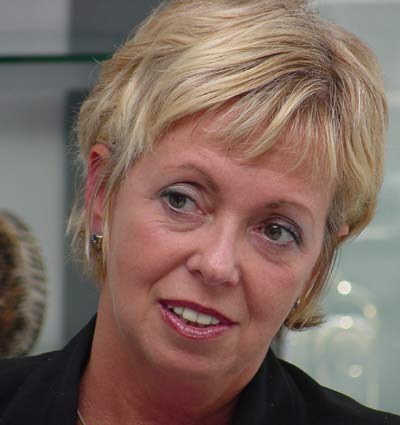 Al: I would like you to give my readers an overall
idea of your organization and then talk about tall ship project in particular.
Al: I would like you to give my readers an overall
idea of your organization and then talk about tall ship project in particular.
Jeannette: First of all, I need to tell you that I
never worked in the music industry. I didn't know anyone two years ago when I
started sponsorKIDS. It is just amazing really, once I was able to
identify what the purpose and the mission was, things started to happen.
SponsorKIDS is a production company that lives and breathes for the sole
purpose of raising money for sponsorKids Charities. SponsorKids
Productions has been established, and that was the first thing that I did.
How do I begin to meet all these people
that I need to bring in and to get this done? I learned about identifying ways
to listen to your own instincts and to put it out there in a plan. In other
words, write out the plan, who do you want to meet, and then go meet them! And
so, I would put out the plan and then I called Susan Sarandon's office and
talked with her publicist. Then she came onboard. Then I thought, how can this
be? It can't be this easy, because everyone else is telling me it is a difficult
business. However, I continued to believe that you can achieve anything in this
world if you just focus on it and have a plan. It takes perseverance and
patience, but it works so beautifully. I believe that the universe is really
trying to conspire with us, not against us, to have us realize good in life and
good in the world. I just decided that that was my mantra. No matter what
anyone thought, I was going to succeed.
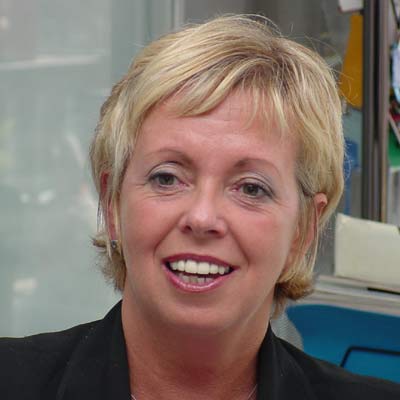 I started to develop a brand, and that actually
happened when I was in Rumania. I called
Rock the Castle. I went to
Rumania and within one week, it was completely sponsored. When I was there, I
thought, "Wow, wouldn't a castle be a great vision. It's also a stationary
venue where you could actually produce music My producer, David Stern, who just
produced the Yankee Stadium Event for 9/11 in New York is now our producer.
I started to develop a brand, and that actually
happened when I was in Rumania. I called
Rock the Castle. I went to
Rumania and within one week, it was completely sponsored. When I was there, I
thought, "Wow, wouldn't a castle be a great vision. It's also a stationary
venue where you could actually produce music My producer, David Stern, who just
produced the Yankee Stadium Event for 9/11 in New York is now our producer.
Therefore, I put it out there. Then I thought
about how I was going to meet people with castles. In addition, within a very
short period of time, I met Richard Branson and his mother. She loved what we
were doing, and so one thing led to another. I wound up going to Morocco and
met with the Minister of Justice there. They gave us a castle in Marrakech and
one in Essaouira, which is on the coast of Morocco.
Then I was at a TV conference a week later and met
a prince who was also a producer from France who has a castle. I thought, "You
know I had never met anyone who had a castle before, now why am I meeting all
these people with castles?" It must be because I've imagined it so. I believe
that the world is conspiring to help me out. And so, I will just continue on
that task.
Sun City has a castle, and they are giving to us
the resort to rock and shake up the house down there too. This all began by
believing and by being pragmatic and knowing that I had to find the venue. I
needed to get some powerhouse people onboard with me. I needed to talk to
everyone that would listen. I needed to get on an airplane if someone was
willing to meet with me. I would go right then.
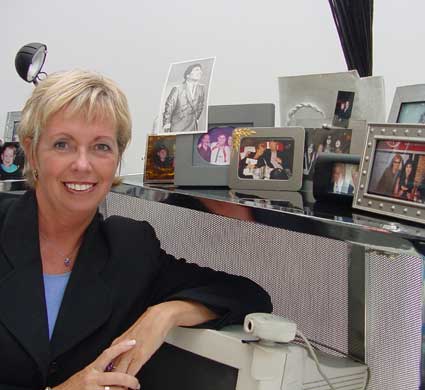 Before I knew it, I met Ike and Tina Turner, and I
was then invited to their anniversary celebration at Tavern on the Green. There
I met Michael Douglas his wife. Through them, I met Whitney Houston and David
Guest, who just married Liza Minnelli. The world is conspiring in a very good
way here!
Before I knew it, I met Ike and Tina Turner, and I
was then invited to their anniversary celebration at Tavern on the Green. There
I met Michael Douglas his wife. Through them, I met Whitney Houston and David
Guest, who just married Liza Minnelli. The world is conspiring in a very good
way here!
Then I got a call from BMG one day when I was on my
way to the airport. I had sent them a fax and called them. I told them that I
would love to meet with them because I needed a label to back us. They called
me when I was on the way to LaGuardia, and ask whether I could meet with them
that day. I had the cab flip around and went right back to Manhattan, and we
met. BMG is onboard. It has just been one tremendous story-one divine
intervention after another. I don't know how else to put it.
In October, I was in Germany with Kaufman of the
Scorpions and the Prime Minister of Germany. Everyone that I am meeting seems
to understand our purpose. They are not interested in putting layers between
who we are and who they were-in other words, it's a direct relationship.
Therefore, I have these baskets of castles now and a lot of talent.
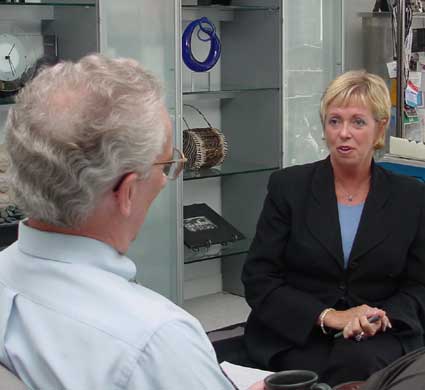 Al: What was your first focus going to be?
Al: What was your first focus going to be?
Jeannette: It was going to be HIV/AIDS. I had worked very closely with
Adrian Belafonte, Harry's daughter. We went to help to identify some programs
to help support in South Africa, because she is working on that.
In the midst of making this decision, 9/11
happened. World peace was already on our agenda, but it immediately became the
first and most prominent issue that we wanted to address. I was missing one
thing and that was a way to link all of these events together some way. How
could I thread them all together? I asked myself this question on either
September 11th or the 12th. I happened to be at a
conference in downtown Chicago about sponsorship, advance filing techniques, and
that type of thing. What I was missing was how to tie all these events
together. At the conference, I was sitting behind a gal who was talking about
tall ships to the woman sitting beside her. I thought, "Oh, wow! Old tall
ships and castles!" I turned around and said "I have a bunch of castles, and
you have tall ships; we have to meet!" She has been tremendous in helping me
understand how the whole world of tall ships work, why they come into ports, how
you get them into ports, and who pays for what. Many of the tall ships are
actually non-profit organizations that help children learn how to sail.
Al: So, now you have ships and castles. Actually,
how many castles do you have under your realm?
Jeannette: We have over sixteen that are logistically
located all over the world. They are located in Portugal, Spain, France, South
Africa, Ethiopia, Madagascar, Morocco, England, Scotland, Ireland, Bolivia,
Brazil, and then we have at least a half a dozen in the U.S. We just got a call
yesterday from Arcadia University in Philadelphia. They have a castle on campus
and want us to come there and rock it. We can sail the ship in and then do
that!
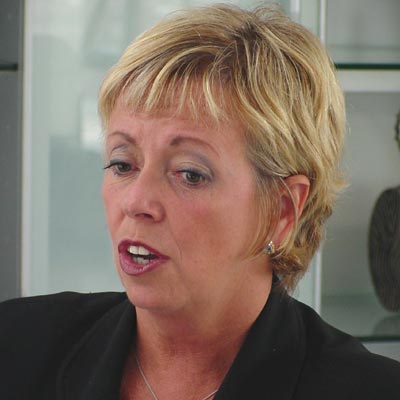 Al: When is the actual kickoff?
Al: When is the actual kickoff?
Jeannette: Actually, it is September 11, 2002. I can
now talk about something that has been in the works. We are getting indications
from Athens Olympic Committee-2004 that they would like to embrace this project
as part of their cultural Olympiad. We haven't really nailed down all the
details, but, as we understand it today, they would like for us to be able to
carry the torch on the ships around the world. So, each time the ship would
dock, we would do a rock concert.
We would also use local musicians. You may see
something like Marc Anthony in Spain playing with the Spanish Philharmonic in
the castle concert. I should point out one thing: it's our objective to go to
every country where the U.S. has ever fought a war as well as those people who
help engage in peace for this world. I have a wonderful composer who is with
Columbia College here in Chicago whose name is Kimo Williams. He fought in Vietnam,
and wrote a beautiful symphony for
the Vietnamese. He went to Vietnam to perform it with the Vietnamese orchestra
there. Kimo befriended Gary Sinese through this process. Now, Gary is playing
the guitar in Kimo's band called Keymotions.
We have invited Kimo and hopefully Gary to come over and play in Vietnam as we
bring the ship into harbor with the Vietnamese Philharmonic as a show of peace
and to help benefit local charities.
This project of having a ship that sails for peace
stopping in all these countries, which will be followed in classrooms around the
world via the internet. We are developing a website where the kids will be able
to follow us by satellite. When we get into the particular harbors, we will
focus on a story, an unsung hero there.
I have a great story of a man from Lisbon who
during WWII was an aristocrat, who found literally thousands of Jews trying to
escape Portugal. The President of Portugal had told all the Portuguese
officials that they would not be allowed to sign any visas to get anyone out of
the country.
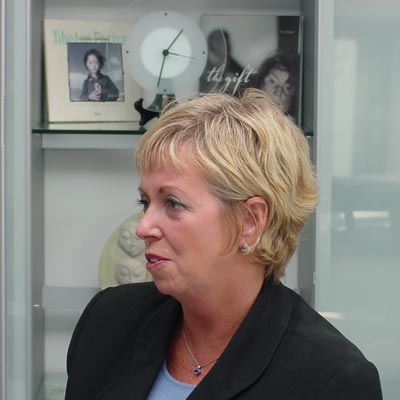 His name was Dr. Mendez. As the story goes, he
went to bed for three days, he was totally
grief-stricken over all these people
who he knew eventually would lose their lives. On the third day, he went down
to the harbor to decide what to do. He was going to have to meet God at some
point in his life and would rather meet him on the terms of saving people's
lives. He went down to the harbor and signed 30,000 visas and literally helped
these people get on ships to North America between in 1942-43.
His name was Dr. Mendez. As the story goes, he
went to bed for three days, he was totally
grief-stricken over all these people
who he knew eventually would lose their lives. On the third day, he went down
to the harbor to decide what to do. He was going to have to meet God at some
point in his life and would rather meet him on the terms of saving people's
lives. He went down to the harbor and signed 30,000 visas and literally helped
these people get on ships to North America between in 1942-43.
I was looking for a story because this is part of
what I am doing,--research to find these unsung heroes. I was invited to an
event that the History Channel was having at Holy Name Cathedral. Half the
people there were Jewish and half the people there were Catholic and other
Christians.
When I got there, I couldn't believe what I saw.
There was the story that I was looking for. Actually, there were four stories
from four different countries. I got to meet the youngest son of Dr. Mendez who
is now 79-years old and lives in San Francisco. His son supplied me with a
tremendous amount of information. The Portuguese government has finally decided
as of November, that they had made a big mistake. His father died in poverty
leaving fourteen children. He died in an old folk's home all by himself because
his name was destroyed. The Portuguese government finally gave him his family
home back. Now, they have this mansion but no money to fix it up. Dr. Mendez
and his son have asked me if I would help them to restore this home and help
make it a museum for peace.
We want to engage kids in the peace process to
write action plans and be a part in their own backyards by lobbying Washington,
or building a peace garden, or writing a rap song. We don't really care what.
We want to engage kids in positive actions so that they don't feel
powerless-that's really our goal. Beyond that, we want to help raise money to
leave behind in each country some symbol of peace. We have a lot of work to do;
that's why I don't get much sleep.
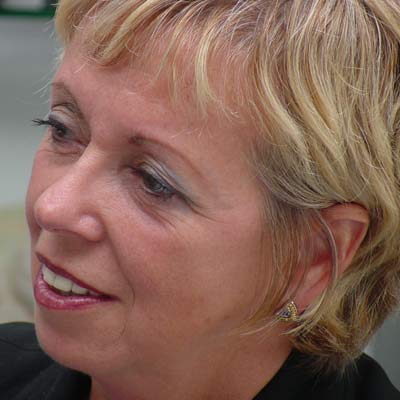 Al: Do you and your husband ever see each other on the airplane?
Al: Do you and your husband ever see each other on the airplane?
Jeannette: Randy is amazing. He knows that this has
become more than just what I am doing; it is who I am-it's my identity. He
gives me 100% support. We are like ships that pass in the night. We have had
that occasion happen, but I'm generally going to New York, Los Angeles, or
Europe, and he is generally going to Canada. He is home usually three or four
nights a week. We have a good life. We support each other in every aspect of
our careers.
Al: What would you like your epitaph to be on your
tombstone?
Jeannette: I have actually given that some thought.
Bruce Lee wrote once, "Here lies a person of perseverance and patience, because
patience is not passive, the concentrated strengths." I really believe that is
so true. Anytime that I feel my patience is waning, I created a mountain and
now I have to climb it. I totally disconnect from the outcome and focus on the
plan. Then I let go, and I believe that it is going to come back.
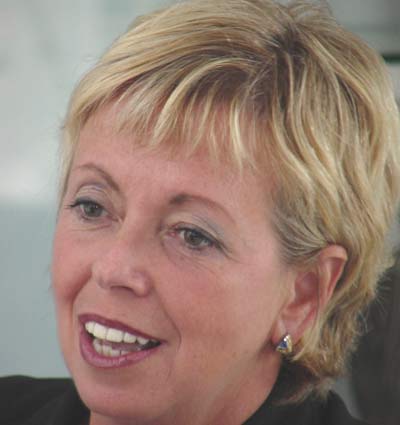 Al: How affected are you by Eastern thought?
Al: How affected are you by Eastern thought?
Jeannette: I have never studied Buddhism or any type
of eastern religion. I have been to Thailand and felt extremely comfortable
going the temple at 5:30 in the morning. I use to hang out with the monks. I
believe that I am drawn to people who try to nurture their inside first-their
heart, their soul, their mind, and then begin to reach out to get the other
things that they need in life. I have always been drawn to that sort of
philosophy. Then everything else will take care of itself.
My friend, Bill Dorgef, wrote the book after letting go. He was an orthopedic surgeon
and decided he wanted to be a photographer. He went to Tibet to setup his
camera in the Himalayas. He was going to photograph. While he was in the
process of letting go of money and everything else, he met these amazing
people. The people would just come up to him. Many of them had never seen a
camera or a Westerner. He took Polaroid shots of them and gave them the
pictures. They would go show them in their little tents. They would come back,
bring two more people, and then he would photograph them. The Dali Lama heard
that he was doing this and invited Bill to come and visit him in India. His
book is entitled The Gift. What he found was that he got everything.
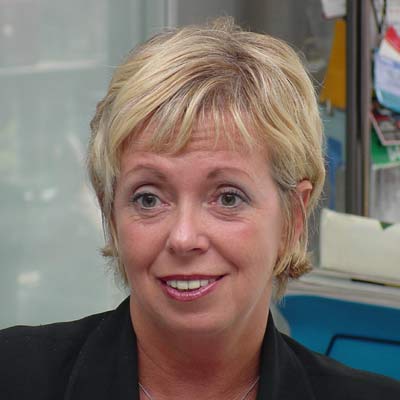 I was in Steven Segal's house last year at a
party. I went into the living room and there the Dalai Lama was sitting. I
didn't know what to do; I was in total awe. The same thing happen when I first
met Paul McCartney. He reached out, took my hand, and held it through the
entire conversation. I had no idea why. I was fourteen all over again! I
couldn't believe it. After he left, someone told me that they knew Linda and
that I had the same mannerisms. But, he is also a very spiritual guy, and we
connected. Energy is conspiring in our favor.
I was in Steven Segal's house last year at a
party. I went into the living room and there the Dalai Lama was sitting. I
didn't know what to do; I was in total awe. The same thing happen when I first
met Paul McCartney. He reached out, took my hand, and held it through the
entire conversation. I had no idea why. I was fourteen all over again! I
couldn't believe it. After he left, someone told me that they knew Linda and
that I had the same mannerisms. But, he is also a very spiritual guy, and we
connected. Energy is conspiring in our favor.
Al: This has been a fascinating interview. I would
like to end it with Gene Siskel's favorite question when he interviewed people.
What is your favorite movie?
Jeannette: Guess Who's Coming to Dinner?
Al: Second favorite movie?
Jeannette: Gladiator.
Al: Who is your favorite painter?
Jeannette: Gauguin.
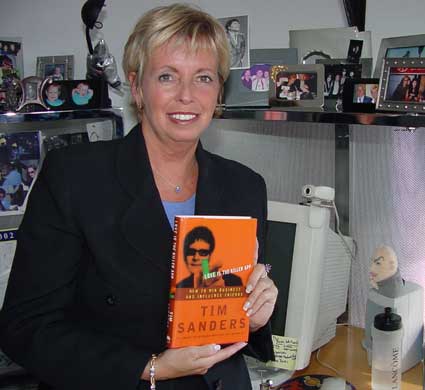 Al: I'll bring you back one of his paintings like
Ia Orana Maria when I go to Tahiti. Who is your favorite writer?
Al: I'll bring you back one of his paintings like
Ia Orana Maria when I go to Tahiti. Who is your favorite writer?
Jeannette: I tend to read so much its hard for me
to narrow it down, but I'm reading an amazing book right now by Tim Sanders, who
is the CSO of Yahoo. The book, Love is
the Killer App, is about caring
about the people you work with and treating them that way. If you do, you will
end up on the good side of everything. He is an amazing man and is very
generous. He came to speak in Chicago and donated the royalties from his book
to charity. I also love Maya Angelou poetry. She gave me one of her books of
poetry, which she signed for me. Maya said, "Love is a condition in the human
spirit so profound that it allows one to survive and better than that, to thrive
with passion, compassion, and style." I really believe that.
Al: I really appreciate your sharing time and your
vision that you have for children of the world. I was going to wish you good
luck, but with your imagination and the world conspiring for you, you don't need
good luck. I hope that this interview will open more doors for you and your
organization.
Jeannette: Thank you for the opportunity to tell
my story to your readers.
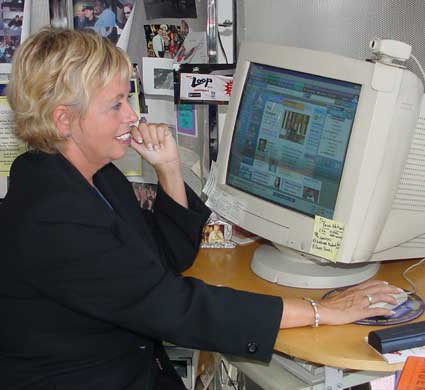
To get in touch with Jeannette:
sponsorKIDS Charities
411 West Ontario Suite 719
Chicago, IL 60610
312.573.1113
312.573.1115 fax
sponsorkids@aol.com
4/02
|







 Al: Jeannette, I would like to get a little history
about you. Are you from Chicago?
Al: Jeannette, I would like to get a little history
about you. Are you from Chicago? Al: What was the name of the town?
Al: What was the name of the town? Al: But you see, those types of negative experiences
can make you who you are. You are more tolerant than many because of those
experiences in Bethel. You can empathize with hurt because you know what it
feels like.
Al: But you see, those types of negative experiences
can make you who you are. You are more tolerant than many because of those
experiences in Bethel. You can empathize with hurt because you know what it
feels like. Al: Do you know any Portuguese?
Al: Do you know any Portuguese? Al: Where did you get your education?
Al: Where did you get your education? I won a sales trip at one point and went to
Caracas, Venezuela. My friend and I decided that we wanted to rent a car and
just go driving. We rented a little Volkswagen and went up into the mountains,
ate fresh fish, and got to meet people. When we started to return, we missed
the exit to go back to the hotel. Well, you know here in Chicago if you miss
the exit, you just keep going, take the exit, and come back. We drove a long
time and finally saw a place where we could pull off. I hoped that we could
just turn around. When we pulled off, here was a truck with a camouflaged
canopy. Gorillas came out, stuck long rifles in the car and demanded that we
give them our money and credit cards.
I won a sales trip at one point and went to
Caracas, Venezuela. My friend and I decided that we wanted to rent a car and
just go driving. We rented a little Volkswagen and went up into the mountains,
ate fresh fish, and got to meet people. When we started to return, we missed
the exit to go back to the hotel. Well, you know here in Chicago if you miss
the exit, you just keep going, take the exit, and come back. We drove a long
time and finally saw a place where we could pull off. I hoped that we could
just turn around. When we pulled off, here was a truck with a camouflaged
canopy. Gorillas came out, stuck long rifles in the car and demanded that we
give them our money and credit cards. I remember seeing my kids' lives flash in front of
me. I knew I wasn't going to die. I just knew that I was lucky. That
experience taught me something very valuable about freedom. This would have
been about 1982, and I was still responsible for my kids and couldn't really
stop what I was doing in my life to analyze how I may be able to use what I was
learning for what I am doing now. I had to put food on the table, make sure the
kids were in soccer and doing all the things they needed to do while I was
supporting them. I was their sole support, until they were out of the house,
into college and getting one with their lives.
I remember seeing my kids' lives flash in front of
me. I knew I wasn't going to die. I just knew that I was lucky. That
experience taught me something very valuable about freedom. This would have
been about 1982, and I was still responsible for my kids and couldn't really
stop what I was doing in my life to analyze how I may be able to use what I was
learning for what I am doing now. I had to put food on the table, make sure the
kids were in soccer and doing all the things they needed to do while I was
supporting them. I was their sole support, until they were out of the house,
into college and getting one with their lives.
 Al: I would like you to give my readers an overall
idea of your organization and then talk about tall ship project in particular.
Al: I would like you to give my readers an overall
idea of your organization and then talk about tall ship project in particular. I started to develop a brand, and that actually
happened when I was in Rumania. I called
Rock the Castle. I went to
Rumania and within one week, it was completely sponsored. When I was there, I
thought, "Wow, wouldn't a castle be a great vision. It's also a stationary
venue where you could actually produce music My producer, David Stern, who just
produced the Yankee Stadium Event for 9/11 in New York is now our producer.
I started to develop a brand, and that actually
happened when I was in Rumania. I called
Rock the Castle. I went to
Rumania and within one week, it was completely sponsored. When I was there, I
thought, "Wow, wouldn't a castle be a great vision. It's also a stationary
venue where you could actually produce music My producer, David Stern, who just
produced the Yankee Stadium Event for 9/11 in New York is now our producer.
 Before I knew it, I met Ike and Tina Turner, and I
was then invited to their anniversary celebration at Tavern on the Green. There
I met Michael Douglas his wife. Through them, I met Whitney Houston and David
Guest, who just married Liza Minnelli. The world is conspiring in a very good
way here!
Before I knew it, I met Ike and Tina Turner, and I
was then invited to their anniversary celebration at Tavern on the Green. There
I met Michael Douglas his wife. Through them, I met Whitney Houston and David
Guest, who just married Liza Minnelli. The world is conspiring in a very good
way here!  Al: What was your first focus going to be?
Al: What was your first focus going to be? Al: When is the actual kickoff?
Al: When is the actual kickoff? His name was Dr. Mendez. As the story goes, he
went to bed for three days, he was totally
grief-stricken over all these people
who he knew eventually would lose their lives. On the third day, he went down
to the harbor to decide what to do. He was going to have to meet God at some
point in his life and would rather meet him on the terms of saving people's
lives. He went down to the harbor and signed 30,000 visas and literally helped
these people get on ships to North America between in 1942-43.
His name was Dr. Mendez. As the story goes, he
went to bed for three days, he was totally
grief-stricken over all these people
who he knew eventually would lose their lives. On the third day, he went down
to the harbor to decide what to do. He was going to have to meet God at some
point in his life and would rather meet him on the terms of saving people's
lives. He went down to the harbor and signed 30,000 visas and literally helped
these people get on ships to North America between in 1942-43.  Al: Do you and your husband ever see each other on the airplane?
Al: Do you and your husband ever see each other on the airplane? Al: How affected are you by Eastern thought?
Al: How affected are you by Eastern thought? I was in Steven Segal's house last year at a
party. I went into the living room and there the Dalai Lama was sitting. I
didn't know what to do; I was in total awe. The same thing happen when I first
met Paul McCartney. He reached out, took my hand, and held it through the
entire conversation. I had no idea why. I was fourteen all over again! I
couldn't believe it. After he left, someone told me that they knew Linda and
that I had the same mannerisms. But, he is also a very spiritual guy, and we
connected. Energy is conspiring in our favor.
I was in Steven Segal's house last year at a
party. I went into the living room and there the Dalai Lama was sitting. I
didn't know what to do; I was in total awe. The same thing happen when I first
met Paul McCartney. He reached out, took my hand, and held it through the
entire conversation. I had no idea why. I was fourteen all over again! I
couldn't believe it. After he left, someone told me that they knew Linda and
that I had the same mannerisms. But, he is also a very spiritual guy, and we
connected. Energy is conspiring in our favor. Al: I'll bring you back one of his paintings like
Ia Orana Maria when I go to Tahiti. Who is your favorite writer?
Al: I'll bring you back one of his paintings like
Ia Orana Maria when I go to Tahiti. Who is your favorite writer?
